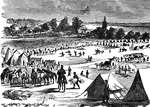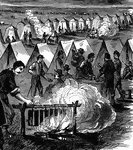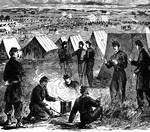Clipart tagged: ‘sunset’

Camp Zagonyi
"Camp Zagonyi, encampment of Fremont's army on the prairie, near Wheatland, Mo., October 14th, 1861.…

Camp Zagonyi
"Camp Zagonyi, encampment of Fremont's army on the prairie, near Wheatland, Mo., October 14th, 1861.…

Camp Zagonyi
"Camp Zagonyi, encampment of Fremont's army on the prairie, near Wheatland, Mo., October 14th, 1861.…

Camp Zagonyi
"Camp Zagonyi, encampment of Fremont's army on the prairie, near Wheatland, Mo., October 14th, 1861.…

Lynnhaven Bay, Virginia
Lynnhaven Bay is a relatively small body of water in Virginia separated from the rest of the Chesapeake…

Sun Rays
It is hotter at noon than at sunrise and sunset because there is a greater thickness of air for the…


